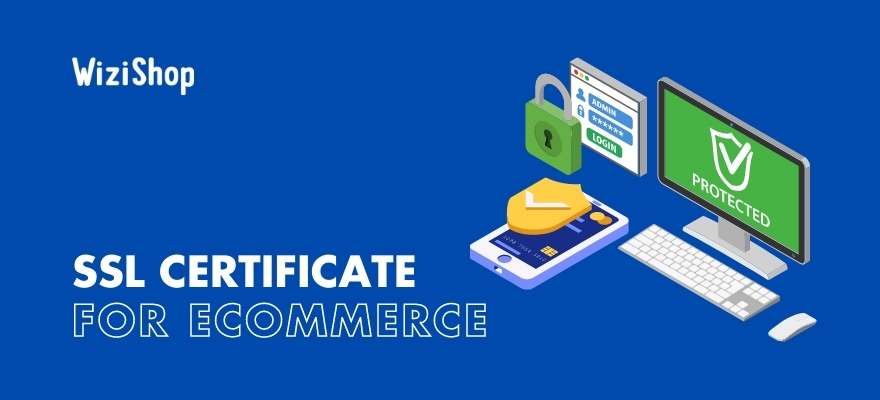The majority of your ecommerce business’s operational activities and transactions are conducted online. It’s easy to feel a false sense of confidence as you sit behind a computer screen to run your business.
In reality, though, you and your customers are exposed to significant cyber threats every day.
When you build an ecommerce website from scratch, there are many things to consider as you attempt to determine exactly what ecommerce customers want and need. Some store features might be more relevant to specific niches, while others are more universal.
However, website security is extremely important for every online business, regardless of the products sold. Effective data encryption is an integral component to an online store’s cyber security efforts.
A closer look reveals a need for a Secure Sockets Layer (SSL) encryption certificate.
What is data encryption?
Since the creation of online shopping, there’ve certainly been a significant number of developments in how stores operate on the internet.
Today, the amount of sensitive data that an ecommerce business like yours handles is substantial. Credit card numbers, account passwords, contact information, social security numbers, and other details about your customers are frequently conveyed online.
Likewise, your business’s finances, sensitive employee data, and more may be maintained and managed online.
Threats from denial-of-service (DoS) attacks, phishing, credit card fraud, identity theft, malware, vishing, and other online risks are real. These threats can wreak havoc on your operations and on your customers’ lives, so taking all reasonable steps to protect your data through encryption is vital.
Data encryption safeguards all of this data from the prying eyes of unauthorized visitors, and these safeguards are most commonly established via SSL certificates.
What is an SSL certificate?
Since 1994, SSL security has been available for use. It continues to be the security standard used by ecommerce sites and information sites today.
The SSL protocol creates a secure lane for your system to connect directly to your consumers’ devices as data is exchanged. This includes connections between computers, mobile devices, and more.
With an SSL certificate in place, customers can safely browse your website, submit personal information, and complete their purchase transactions without concern about online threats.
At the same time, their experience won’t be impaired by the extra layer of security provided by the SSL certificate.
In fact, the only difference that online users should experience with this safeguard in place is a padlock icon in the URL. They’ll also see any special badging that you place on your website indicating that the site is secure.
What types of validation do the different certificates provide?
Various SSL certificate authorities issue these certificates. As you prepare to upgrade the security on your ecommerce website, be aware that the certificate authorities vary considerably.
More than that, the certificates that they offer also vary. These are among the more common types of SSL certificates that you can choose from for your website.
Domain validation
A domain validation certificate offers base-level security. It’s most commonly used by information websites like blogs rather than by ecommerce sites. This type of validation is generally the fastest and most affordable type of SSL certificate available.
With a domain validation certification, your website will benefit from basic encryption. Users will also know that the domain name registration and ownership information have been verified.
Organization validation
Organization validation takes security to the next level and may be used by some ecommerce websites. It includes the domain validation securities and extends security with a review of the domain owner’s name and address.
The organization validation process may take a few hours or longer to complete because it’s a more in-depth process.
Extended validation
The highest-level validation currently available is the extended validation certificate.
It adds onto the verifications in the domain and organization validations by obtaining details on the physical, legal, and operational existence of the domain owner. This level of verification can take several days or even weeks to obtain.
Why is SSL certification important for your ecommerce business?
Many internet users are observant as to whether or not their connection to a specific website is secure. They may quickly click off of the website if they don’t trust it. As beneficial as the SSL certificate is to consumers, it offers several important advantages for ecommerce businesses.
1. Allows for secure payments
Many website hosting service providers require ecommerce businesses to have SSL encryption before they can accept online credit card payments.
In addition to being a veritable necessity to establish a merchant account, the SSL certificate is essential for protecting your customers during the purchase process.
2. Ensures password login protection
Login and password data are common targets of hackers. This information is passed freely between a user’s device and your website. Without an SSL certificate, anyone paying attention to the website can capture that data and may use it for nefarious purposes.
3. Offers web form security
While payment data, login IDs, and passwords are commonly targeted by hackers, other data is vulnerable as well. Does your website ask your visitors or customers to provide their email address, contact information, answers to security questions, and other facts?
All of this private information is at risk of being intercepted if your website isn’t secured by an SSL certificate.
4. Helps improve SEO with Google
Given how increasingly crowded the internet is, you don’t want to miss out on any opportunities to boost your website’s placement on search engine results pages.
For years, Google has given a slight preference to websites with SSL encryption. While this boost is decidedly minimal, it’s an easy step to take that produces a positive result.
5. Boosts consumer confidence
Establishing trust in new visitors who are unfamiliar with your business or brand is challenging to do online. The last thing that you want is to give your customers a reason to doubt your business’s legitimacy or to feel uncertain about doing business with you.
Fortunately, the presence of the SSL certificate usually erases (or at least minimizes) concerns about the protection of their personal and financial data.
If you’re still on the fence about investing in an SSL certificate, consider the ramifications of not having this level of encryption in place. Fraud, identity theft, and other risks to your customers can generate bad press, possibly causing long-term or irreparable damage to your business’s image.
Where can you obtain an SSL certificate?
Clients of WiziShop benefit from a free SSL certificate on all the pages of their ecommerce site, not just on the payment pages. WiziShop offers SSL/TLS certificates because this protocol guarantees flawless security for your ecommerce site.
Based on the score calculated by the Qualys SSL Labs Index, the certificate offered by WiziShop is qualified as A+. Safety is therefore raised to its maximum.
In addition, true to WiziShop’s model and its SaaS identity, no technical installation is necessary on your part to ensure that managing your ecommerce site and its security is as easy as possible.
The configuration and maintenance are established by us. It’s therefore automatically configured and will renew itself every year for your store. No need to buy an SSL certificate anymore!
Encrypting your website with an SSL certificate is more than a good business practice. It’s essential for doing business online and instilling customer trust.
Whether you’re launching a new ecommerce site or trying to grow your existing online business, it’s crucial that you invest in an SSL certificate from a trusted provider.










